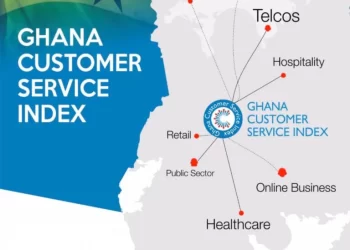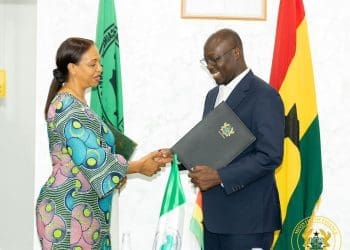At the third edition of the Fidelity Sustainability Conference, leaders across finance, policy, and industry shared insights on how Ghana’s financial sector can align climate action with finance. This article captures the highlights and forward-looking insights from the conference.
The message was clear: sustainability is no longer a side agenda for corporate social responsibility; it is a business imperative at the heart of the financial system.
Over the past two decades, banks worldwide have shifted towards embedding sustainability into their strategies because every financing decision has ripple effects across value chains, livelihoods, and long-term growth.
As the UN Resident Coordinator, Zia Choudhury, reminded participants in his keynote, renewable energy consistently outperforms fossil fuels in risk-adjusted returns.
This calls for what he described as a “new love affair” with sustainable finance; one that shapes the future of development and investment in Ghana and beyond.
Building the groundwork
That future rests on the frameworks being laid today. Ghana’s Sustainable Banking Principles are designed to attract and deploy green capital while holding boards accountable for climate-aligned decision-making.
Alignment with international standards such as IFRS S1 and S2, and the development of a Transition Finance Framework, will be pivotal in ensuring credible reporting and unlocking carbon market opportunities.
Fidelity Bank has also launched a Three-Year Climate Strategy Implementation Plan (2025–2027), co-designed with AfricInvest, Proparco, and IPC, which seeks to translate commitments into concrete action by integrating climate considerations into every layer of banking operations.
Power of partnerships
The conference underscored that no single institution can drive this agenda alone.
Partnerships with the United Nations, the Global Centre for Adaptation, Joy FM, the Institute of Sustainability Professionals Ghana, and The Palms by Eagles have created a broad coalition for climate action.
New collaborations with Innohub and GrowthAfrica will expand support for green entrepreneurs, while agencies such as the Bank of Ghana and the Ghana Investment Promotion Centre are helping to open access to multilateral climate funds and mainstream sustainability into education.
Innovation at the forefront
Innovation also took centre stage. Through the Fidelity Bank GreenTech Innovation Challenge, the bank has committed over GH₵1 million, catalysing more than GH₵13 million in revenue and benefitting over 900 people with technologies such as solar dryers and organic fertilisers.
The Orange Inspire Creative Challenge celebrated solutions at the intersection of creativity and sustainability, proving that profit and purpose can indeed coexist.
Twenty-five innovators have already completed an intensive bootcamp, with prize winners and finalists receiving capital and mentorship to scale their solutions.
Financing the transition
At the same time, financing instruments are being reshaped to respond directly to the real economy.
Fidelity’s new electric vehicle financing product offers competitive loans that make EV ownership more accessible, reducing emissions while generating long-term savings.
Work is also underway to develop sustainable agriculture financing models and ESG-linked investment products that empower resilience and align investor portfolios with climate goals.
Still, the path forward requires more structured, affordable finance, supported by robust data and climate risk modelling to de-risk adaptation projects.
Engaging stakeholders
Effective stakeholder engagement and localisation strategies are vital in translating these initiatives into real impact.
As panellists noted, communication must begin with the tangible benefits, for instance, showing how net-metering could reduce unemployment by encouraging small-scale renewable adoption. Fast-tracking fintech development, leveraging agency banking, and amplifying testimonials from successful beneficiaries are among the strategies identified to bring sustainability closer to people’s everyday realities.
Fidelity Bank is positioning itself as a national champion in this regard, committed to building specialised green-finance skills and mobilising stakeholders behind a unified effort.
A call to action
The conference closed with a strong call to action. Mobilising private sector capital with urgency and precision is no longer optional if Ghana is to meet its Nationally Determined Contributions under the Paris Agreement and secure a just transition.
As the Managing Director, Julian Opuni, reaffirmed, Fidelity Bank is committed to standing shoulder-to-shoulder with partners, deploying capital where it changes lives, safeguards the planet, and delivers measurable impact.
This is the time for a new love affair with climate finance, one that will be deepened in Fidelity’s forthcoming 2026–2030 Sustainability Strategy.
The priorities are clear: establish real-time dashboards to track impact metrics for GreenTech cohorts, EV financing, and ESG products; develop a national Transition Finance Framework to validate carbon markets; convene sector-specific roundtables on agriculture, renewable energy, and gender-lens investing; deepen partnerships on data infrastructure for climate risk modelling; and conduct a mid-term review in the third quarter 2025 to recalibrate the Three-Year Climate Strategy.
The Fidelity Sustainability Conference concluded with optimism but also a sober reminder.
The financial sector cannot simply finance the transition: it must lead it.
In doing so, Ghana’s banks will not only safeguard the economy against climate shocks but also unlock opportunities for innovation, resilience, and inclusive growth.














